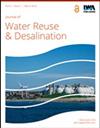膜基深度处理工艺回用城市污水的技术经济分析
IF 2.3
Q2 Environmental Science
引用次数: 17
摘要
本文的目的是在荷兰市场条件下,比较三种水再利用类型(即饮用水、工业水和农业水再利用)的基于膜的先进处理工艺的能耗和净成本。水源为城市污水处理厂出水。结果表明,需要应用反渗透来回收高质量的水用于工业和饮用水的再利用,但不用于灌溉水,这提供了显著的能源节约,但可能不会自动降低净成本。虽然工业再利用的回收工艺在经济上最有前景,但由于水价低,灌溉水回收工艺成本效益不高。此外,流程运营支出可能超过资本支出,这对招标程序很重要。一个重要的成本因素是可能超过能源成本的废物管理。在反渗透之前,通过整合软化剂/生物稳定剂单元,可以显著提高水的回收率。此外,废水回收过程的能耗可以通过太阳能现场供应。简要讨论了设计一种“适合多用途”回收工艺的可能性。从工艺设计的角度来看,这种比较分析可以更好地决定在城市废水再利用项目中优选哪种再利用类型。本文章由计算机程序翻译,如有差异,请以英文原文为准。
A techno-economic analysis of membrane-based advanced treatment processes for the reuse of municipal wastewater
The objective of this paper is to compare, under Dutch market conditions, the energy consumption and net costs of membrane-based advanced treatment processes for three water reuse types (i.e. potable, industrial, agricultural reuse). The water source is municipal wastewater treatment plant effluent. Results indicate that the application of reverse osmosis is needed to reclaim high quality water for industrial and potable reuse but not for irrigation water which offers significant energy savings but may not lead automatically to lower net costs. While a reclamation process for industrial reuse is economically most promising, irrigation water reclamation processes are not cost effective due to low water prices. Moreover, process operational expenditures may exceed capital expenditures which is important for tender procedures. A significant cost factor is waste management that may exceed energy costs. Water recovery rates could be significantly enhanced through the integration of a softener/biostabilizer unit prior to reverse osmosis. Moreover, the energy consumption of wastewater reclamation processes could be supplied on-site with solar energy. The possibility of designing a ‘fit for multi-purpose’ reclamation process is discussed briefly. This comparative analysis allows for better informed decision making about which reuse type is preferably targeted in a municipal wastewater reuse project from a process design perspective.
求助全文
通过发布文献求助,成功后即可免费获取论文全文。
去求助
来源期刊

Journal of Water Reuse and Desalination
ENGINEERING, ENVIRONMENTAL-WATER RESOURCES
CiteScore
4.30
自引率
0.00%
发文量
23
审稿时长
16 weeks
期刊介绍:
Journal of Water Reuse and Desalination publishes refereed review articles, theoretical and experimental research papers, new findings and issues of unplanned and planned reuse. The journal welcomes contributions from developing and developed countries.
 求助内容:
求助内容: 应助结果提醒方式:
应助结果提醒方式:


